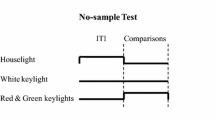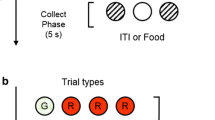Abstract
Trials for food-deprived pigeons began with the illumination of the grain feeder lamp. On a random one-half of the trials, the feeder tray was raised so that the bird could eat. After a delay, which varied between 0 and 25 sec., two response keys were illuminated, one with red and one with green light. Pecking the red (green) key produced grain reinforcement if the trial had started with food (no food); pecking red after no food and green after food was not reinforced. Pecking was controlled by these conditional relations among stimuli, even at the longer delay intervals. Control of pecking was not different on trials that began with food and no food. These results are consistent with a body of literature which suggests that food-related events are memorable.
Similar content being viewed by others
Reference Note
BOTTJER, S. W., & HEARST, E. 1976. A feature-positive superiority in discriminations based on memory of a pre-trial food delivery. Paper presented at the annual meeting of the Psychonomic Society, St. Louis.
References
BLOUGH, D. S. 1959. Delayed matching in the pigeon. Journal of the Experimental Analysis of Behavior, 2, 151–160.
BRODIGAN, D. L., & PETERSON, G. B. 1976. Two-choice conditional discrimination performance of pigeons as a function of reward expectancy, pre-choice delay, and domesticity. Animal Learning and Behavior, 4, 121–124.
CAPALDI, E. J. 1967. A sequential hypothesis of instrumental learning. In W. K. Spence & J. T. Spence (Eds.), The psychology of learning and motivation. Vol. 1. New York: Academic Press.
CUMMING, W. W., & BERRYMAN, R. 1965. The complex discriminated operant: Studies of matching-to-sample and related problems. In D. I. Mostofsky (Ed.), Stimulus generalization. Stanford: Stanford University Press.
D’AMATO, M. R. 1973. Delayed matching and short-term memory in monkeys. In G. H. Bower (Ed.), The psychology of learning and motivation. Vol. 7. New York: Academic Press.
D’AMATO, M. R., & WORSHAM, R. W. 1974. Retrieval cues and short-term memory in capuchin monkeys. Journal of Comparative and Physiological Psychology, 86, 274–282.
HONIG, W. K. In press. Studies of working memory in the pigeon. In S. Hülse, H. Fowler, & W. K. Honig (Eds.), Cognitive aspects of animal behavior. Hillsdale, N. J.: Lawrence Erlbaum Associates.
KELLO, J. E. 1972. Reinforcement-omission effect on fixed-interval schedules: Frustration or inhibition? Learning and Motivation, 3, 138–147.
MAKI, W. S., Jr., MOE, J. C., & BIERLEY, C. M. 1977. Short-term memory for stimuli, responses, and reinforcers. Journal of Experimental Psychology: Animal Behavior Processes, 3, 156–177.
PSCHIRRER, M. 1972. Goal events as discriminative stimuli over extended intertrial intervals. Journal of Experimental Psychology, 96, 425–432.
ROBERTS, W. A., & GRANT, D. S. 1976. Studies of short-term memory in the pigeon using the delayed matching to sample procedure. In D. L. Medin, W. A. Roberts, & R. T. Davis (Eds.), Processes of animal memory. Hillsdale, N. J.: Lawrence Erlbaum Associates.
STADDON, J. E. R. 1974. Temporal control, attention, and memory. Psychological Review, 81, 375–391.
TERRY, W. S., & WAGNER, A. R. 1975. Short-term memory for “surprising” versus “expected” unconditioned stimuli in Pavlovian conditioning. Journal of Experimental Psychology: Animal Behavior Processes, 104, 122–123.
Author information
Authors and Affiliations
Additional information
This research was supported by the National Research Council of Canada. Marcia Spetch and Mike Gordon assisted with the experiment. These data were presented at the 1976 meeting of the Psychonomic Society.
Rights and permissions
About this article
Cite this article
Wilkie, D.M. Delayed Symbolic Matching to Sample in the Pigeon. Psychol Rec 28, 463–469 (1978). https://doi.org/10.1007/BF03394558
Published:
Issue Date:
DOI: https://doi.org/10.1007/BF03394558




